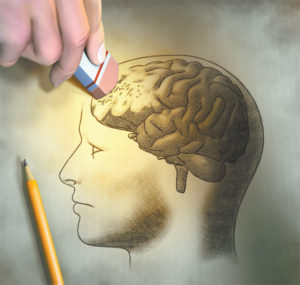By Robert C. Goethe, MD
 Alzheimer’s disease a progressive deterioration of the brain and is one of the most frustrating diseases that medicine deals with. While we know a little bit about it, there is no way to prevent it and no cure has been found. About one out of 10 people will develop Alzheimer’s disease. It has a slow insidious onset but is progressive and usually fatal within 3 to 9 years after diagnosis. Generally, the symptoms are noticed first by people that are closest to the patient (close friends and family members). There is a noticeable lapse in short term memory but long term memory stays relatively intact. Patients have difficulty with vocabulary, difficulty with directions and remembering names. As Alzheimer’s progresses there are notable mood swings. The patients become withdrawn and depressed or may have inappropriate bursts of anger or sadness.
Alzheimer’s disease a progressive deterioration of the brain and is one of the most frustrating diseases that medicine deals with. While we know a little bit about it, there is no way to prevent it and no cure has been found. About one out of 10 people will develop Alzheimer’s disease. It has a slow insidious onset but is progressive and usually fatal within 3 to 9 years after diagnosis. Generally, the symptoms are noticed first by people that are closest to the patient (close friends and family members). There is a noticeable lapse in short term memory but long term memory stays relatively intact. Patients have difficulty with vocabulary, difficulty with directions and remembering names. As Alzheimer’s progresses there are notable mood swings. The patients become withdrawn and depressed or may have inappropriate bursts of anger or sadness.
The diagnosis of Alzheimer’s is made by observation of the patient’s behavior and having the patient take cognitive test. There are no lab test for Alzheimer’s other than to make sure the dementia is not caused by other factors such as hypothyroidism or a chemical imbalance.
There is no way to prevent Alzheimer’s – it’s considered to be mostly genetic. There are some thoughts that obesity, hypertension, history of head trauma or maybe diabetes might predispose to it but no one has proven a definite correlation. There’s also some thought that remaining active and keeping your mind busy might be preventative but this hasn’t been proven to be true either. It’s just gonna happen to 10% of people no matter what they may do to prevent it.
Physicians do know this about Alzheimer’s though, the brains of Alzheimer’s patients have microscopic deposits of protein that are deposited around the brain cells called amyloid plaques. These plaques interrupt the transmission of nerve impulses between the brain cells and therefore interfere with memory and thinking. The brain cells quit communicating with each other. There has been some hope that the pharmaceutical industry will produce a drug that can prevent the deposits of these amyloid plaques and therefore prevent or maybe stop the progression of Alzheimer’s disease. In fact, just a couple years ago it seemed that there were two very promising drugs in the pipeline.
Unfortunately, both of these drugs failed to be effective in clinical trials and therefore as yet, there is no cure. And then there are some other drugs approved for use with Alzheimer’s patients that may help memory but they have minimal effect and don’t do anything to actually cure or slow the disease. Plus, they have unpleasant side effects.
A problem commonly seen in nursing homes is over use of antidepressants and antipsychotic drugs to basically sedate patients and make them easier for the staff to take care of. Patients become like zombies and don’t require interaction. This is criticized as inhumane and actually will take any potential pleasure out of the patients life as well as shorten their lifespan.
Medical marijuana (cannabis) has been found to be useful for Alzheimer’s patients for mood disorders and depression without the dangerous side effects seen with the major tranquilizers and antipsychotics. In fact, in California which has had medical cannabis for 22 years now, doctors have found cannabis to be very useful in nursing home patients with Alzheimer’s. By using various strains for various symptoms they can calm, increase appetite, and add a little euphoria for mood, and help with sleep. Generally, very small doses are used.
In 2014, researchers at the Salk Institute happened upon the discovery that THC which is the ingredient in marijuana which can make you high was found to stop and reverses the amyloid plaque production in human brain cell cultures in the lab which cause Alzheimer’s. This exciting discovery had the potential of being developed into a medicine that could actually slow, stop or reverse Alzheimer’s disease. Unfortunately, the federal government still has marijuana has a Schedule 1 drug. By Federal definition, a Schedule 1 drug has no medical use and a high likelihood of addiction. We know now that this was an inaccurate classification and unfortunately makes research in the United States almost impossible. Sure enough, the Federal government would not allow clinical trials to proceed without the threat of the institution losing federal funding. However this promising finding has not gone unnoticed and research is being done now using state and other funding. For Alzheimer’s patients, this is very exciting news.
While we wait for a cure, we do know now that cannabis is is a great medicine for management of Alzheimer’s symptoms and has a very good safety profile. If it actually slows or stops the progression, that is just an added bonus. Time will tell. But we already do know that it has neuro-protective properties already recognized. It stops seizures in some drug resistant epileptics and calms tremors in Parkinson’s patients. It appears to lessen the damage of head trauma such as concussions incurred on the football field. It controls pain and seems to have an anti-cancer effect. Even the federal government knows of the enormous potential medical potential of marijuana because they obtained their own patent on one of its major components called CBD in 1994.
Since medical marijuana was legalized in Florida in 2016, it is rapidly gaining wide acceptance by patients. There are now over 100,000 people with medical marijuana cards in Florida. It’s not widely used in nursing homes yet because of the fear imposed by the power of the federal government who still carries the threat of pulling Medicare funding, but hopefully this will be changing soon as it is recognized as the great alternative it can be for Alzheimer’s patients.
On Facebook like our page for more information, search for Better Health Compassion Clinic
If you’re interested, please call 352-601-4200 or email DrBobGoethe@gmail.com – Check out our website: www.compassionclinicflorida.com
Dr. Bob Goethe is a board certified anesthesiologist, with over 40 years of medical experience who is now semi-retired in Citrus County and chooses to support the medical marijuana initiative because he has seen it’s benefits in patients and strongly believes in the cause.
Check Also
Pilates and the Mind: Unlocking Mental Wellness Through Movement
While Pilates is widely celebrated for its physical benefits—stronger muscles, better posture, improved flexibility, and …
 Central Florida Health and Wellness Magazine Health and Wellness Articles of the Villages
Central Florida Health and Wellness Magazine Health and Wellness Articles of the Villages



